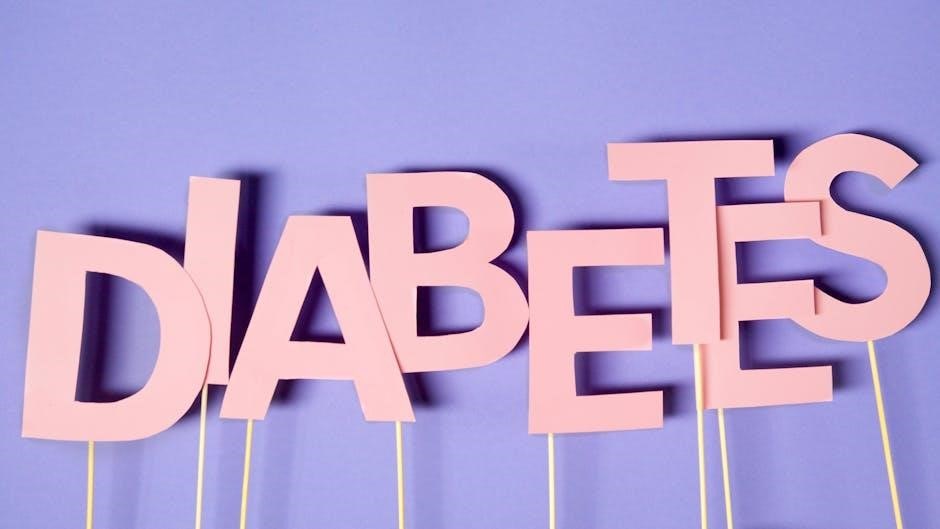Welcome to the 14-Day No Sugar Diet, a simple and effective plan to reset your eating habits. This program helps eliminate added sugars, promoting improved health and nutrition. By focusing on whole foods, you’ll reduce cravings and boost energy. Start your journey with nuts and seeds as a great non-sugar snack option, supporting your weight loss and wellness goals in just two weeks.
What is the 14-Day No Sugar Diet?
The 14-Day No Sugar Diet is a structured program designed to help individuals eliminate added sugars from their diet. It focuses on whole, nutrient-rich foods like vegetables, lean proteins, and healthy fats. The plan encourages the inclusion of nuts and seeds as non-sugar snacks, providing essential fats, protein, and nutrients. By cutting out sugary foods and drinks, participants aim to reduce cravings, stabilize energy levels, and improve overall health. This short-term commitment is ideal for those looking to kickstart a healthier lifestyle and reset their eating habits.
Why Reduce Sugar Intake?
Reducing sugar intake is crucial for overall health, as high consumption is linked to weight gain, obesity, and chronic diseases like diabetes. Excess sugar disrupts blood sugar balance, leading to energy fluctuations and increased hunger. Cutting it out helps stabilize blood sugar levels, promoting better energy and digestion. It also supports weight loss by eliminating empty calories. Incorporating nuts and seeds as snacks provides healthy fats and nutrients, making it easier to stick to the diet. This reduction fosters a healthier metabolism and long-term well-being.
How to Prepare for the Diet
Preparing for the 14-Day No Sugar Diet involves planning meals, identifying hidden sugars, and restocking your pantry. Start by grocery shopping for whole foods like vegetables, proteins, and healthy fats. Clear out sugary snacks and drinks to avoid temptation. Educate yourself on hidden sources of sugar in foods like sauces and condiments. Stock up on nuts and seeds for quick, non-sugar snacks. Lastly, download a 14-Day No Sugar Diet PDF guide for structured meal plans and tips to ensure a smooth transition.

Benefits of a No Sugar Diet
The 14-Day No Sugar Diet offers benefits like weight loss, improved blood sugar control, and increased energy. Incorporate nuts and seeds for healthy snacks.
Improved Blood Sugar Control
Eliminating added sugars stabilizes blood glucose levels, reducing insulin spikes. This helps prevent energy crashes and supports long-term health. Incorporate nuts and seeds as healthy snacks.
Weight Loss Opportunities
Cutting out sugar can lead to significant weight loss by reducing calorie intake and eliminating empty calories. Without sugary treats, your body burns stored fat for energy. Incorporating nuts and seeds provides healthy fats and protein, keeping you full longer and boosting metabolism. portion control is key, as they are calorie-dense; This diet helps reset your eating habits, making sustainable weight loss achievable. Focus on whole foods to maximize results and maintain a balanced diet during your 14-day journey.
Enhanced Energy Levels
Reducing sugar intake stabilizes blood sugar levels, eliminating energy crashes and fatigue. By avoiding sugar spikes, your body relies on stored fat for energy, providing consistent vitality. Incorporating nuts and seeds offers sustained energy due to their healthy fats and protein. This diet promotes long-lasting energy levels, helping you stay active and focused throughout the day. Proper hydration and balanced nutrition further support this energy boost, making it easier to maintain your daily routine without relying on sugary snacks.
Better Digestive Health
Eliminating added sugars reduces inflammation and promotes a balanced gut microbiome, improving digestion. Whole, nutrient-rich foods like vegetables and whole grains support digestive health by providing essential fiber, which aids in regular bowel movements and prevents bloating. Staying hydrated is crucial, as water helps dissolve nutrients and prevents constipation. By focusing on natural, unprocessed foods, the 14-Day No Sugar Diet fosters a healthier digestive system, reducing symptoms like bloating and indigestion while enhancing overall well-being and nutrient absorption.
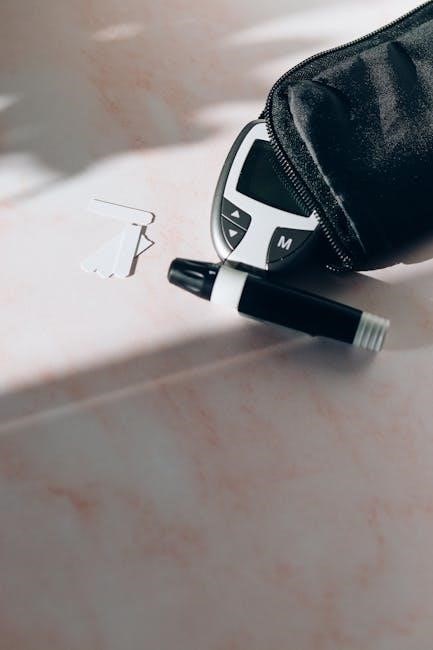
Understanding Sugar in Your Diet
Recognizing sugar in your diet is key to this program. Learn about natural sugars, added sugars, and hidden sources in foods. Use filetype:pdf to find detailed guides and meal plans tailored to your needs.
Different Types of Sugar
Understanding sugar types is essential for your diet. Natural sugars, like those in fruits and vegetables, are accompanied by fiber and nutrients. Added sugars, found in processed foods, lack nutritional value. Recognizing these differences helps you make healthier choices. Utilize PDF resources with filetype:pdf to explore detailed charts and guides. This knowledge will empower you to identify and eliminate unnecessary sugar from your meals, aiding in your weight loss and overall well-being during the 14-day program.
Hidden Sources of Sugar
Sugar is often concealed in everyday foods. Sauces, bread, and even savory products contain hidden sugars. These can quickly add up, hindering your progress. Be vigilant by checking labels for terms like sucrose, fructose, or maltodextrin. PDF guides can provide detailed lists of common culprits. Staying informed helps you avoid unintentional sugar intake, ensuring your diet remains on track. This awareness is crucial for achieving the full benefits of the 14-day program and maintaining a healthier lifestyle beyond it.
Reading Food Labels
Mastering the skill of reading food labels is essential for a successful no-sugar diet. Always check the ingredients list for hidden sugars, such as sucrose, fructose, or high-fructose corn syrup. Pay attention to the nutrition facts panel, where sugars are listed in grams. Aim for products with less than 8 grams of sugar per serving. Be wary of deceptive labeling and choose items with fewer, recognizable ingredients. This practice helps you make informed choices and stay aligned with your 14-day no-sugar goals, ensuring a healthier and more mindful diet.

Meal Planning for the 14-Day Diet
Plan balanced meals with protein, vegetables, and healthy fats. Incorporate nuts and seeds for non-sugar snacks. Avoid hidden sugars and follow a structured guide for success.
Breakfast Ideas
Start your day with protein-rich foods and healthy fats. Try scrambled eggs with vegetables, avocado, or a keto smoothie. Incorporate nuts and seeds for added crunch and nutrients. Avoid sugary cereals and opt for whole, unprocessed foods; Consider a breakfast salad with spinach, mushrooms, and olive oil. For a quick option, a handful of almonds or chia seeds with a non-sugar yogurt works well. Stay hydrated and avoid hidden sugars in condiments or processed items. These breakfast ideas support your low-sugar lifestyle and keep you energized throughout the morning.
Lunch Options
Focus on balanced meals with protein, vegetables, and healthy fats. Grilled chicken or fish with roasted vegetables like broccoli or Brussels sprouts is ideal. A salad with mixed greens, avocado, and olive oil dressing is another great option. Opt for lean meats or tofu for vegetarian choices. Avoid sugary dressings and sauces. Consider a lentil or vegetable stir-fry with coconut oil or ghee. Stay hydrated with water or herbal tea. Avoid processed foods and hidden sugars in condiments. These options keep you satisfied and aligned with your low-sugar goals.
Dinner Recipes
For dinner, focus on hearty, sugar-free meals. Grilled chicken breast with roasted vegetables like asparagus or cauliflower is a great option. Baked salmon with a side of sautéed spinach and mushrooms is both nutritious and flavorful. Try stir-fries with lean meats or tofu, using coconut oil and herbs for seasoning. Stuffed bell peppers with quinoa, ground turkey, and spices are another delicious choice. Avoid sugary sauces and opt for olive oil or avocado for added flavor. These recipes ensure a satisfying and sugar-free evening meal.
Healthy Snacks
Healthy snacks are essential to curb hunger between meals. Opt for nuts like almonds or walnuts, which are rich in healthy fats and protein. Veggie sticks with hummus or guacamole make for a tasty, sugar-free option. Hard-boiled eggs or a handful of seeds like pumpkin or chia are also great choices. Fresh berries in moderation or a small apple with almond butter can satisfy sweet cravings without added sugar. Always portion control to avoid overeating and choose snacks that keep you full and energized.
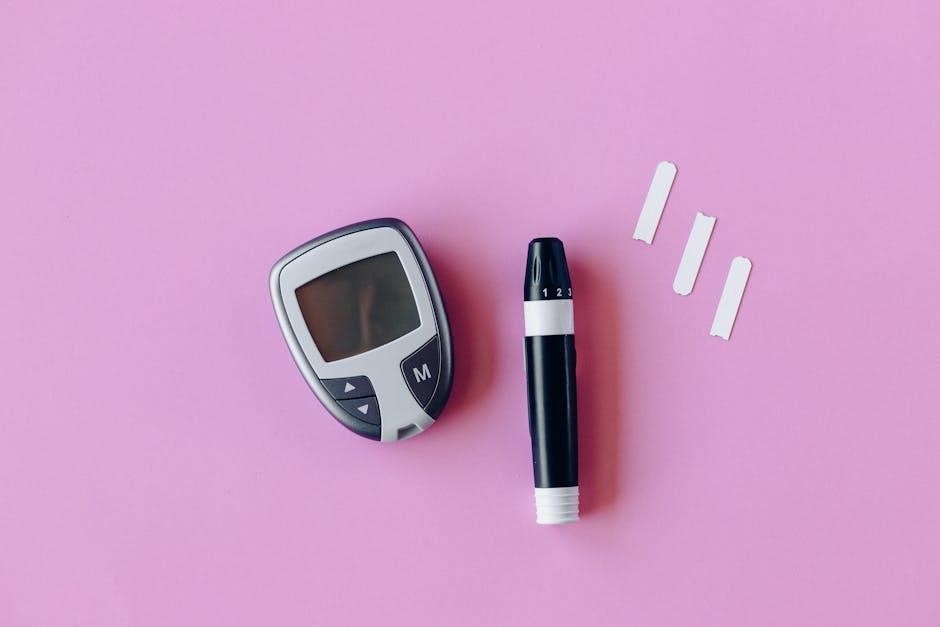
Important Foods to Include
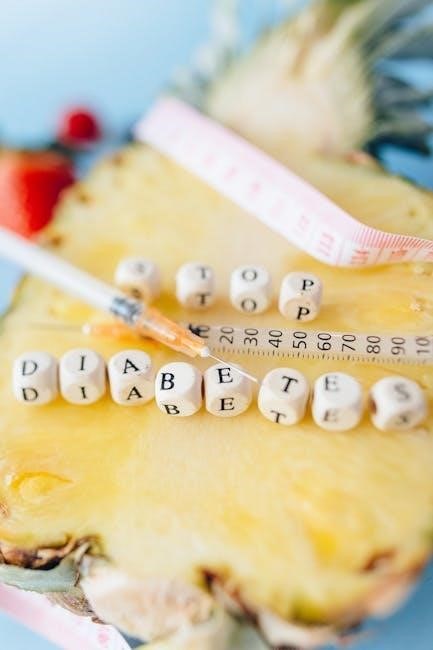
Focus on protein-rich foods, vegetables, and healthy fats. Include nuts, seeds, and whole grains to support metabolism and provide essential nutrients for a balanced diet.
Protein-Rich Foods
Protein-rich foods like chicken, turkey, fish, eggs, and tofu are essential for muscle repair and satiety. They help reduce sugar cravings and stabilize blood sugar levels. Include lean meats, fish varieties, and plant-based options like beans and lentils. Opt for unprocessed sources to avoid hidden sugars. Protein keeps you fuller longer, making it easier to stick to your diet. Pair proteins with vegetables for balanced meals that support weight loss and overall health during your 14-day no sugar challenge.
Vegetables and Fiber
Incorporating a variety of vegetables and fiber-rich foods is crucial for a balanced diet. Vegetables like broccoli, spinach, and Brussels sprouts are low in sugar and high in nutrients. Fiber helps regulate blood sugar levels, promotes digestion, and keeps you feeling full. Aim for colorful, non-starchy vegetables to reduce sugar cravings and support overall health. Fiber-rich foods like asparagus and leafy greens also aid in detoxifying the body and maintaining stable energy levels throughout the day.
Healthy Fats

Healthy fats are essential for hormone production, satiety, and nutrient absorption. Include sources like avocados, olive oil, and fatty fish such as salmon. Nuts and seeds, like almonds and chia seeds, are also excellent choices. These fats provide sustained energy, reduce sugar cravings, and support overall health. They balance meals and keep you fuller for longer, making them a key component of the 14-day no sugar diet. Prioritize whole, unprocessed sources to maximize benefits and avoid refined fats found in processed foods.
Nuts and Seeds
Nuts and seeds are nutrient-dense additions to the 14-day no sugar diet, offering healthy fats, protein, and fiber. Opt for unsweetened, raw varieties like almonds, walnuts, chia seeds, and flaxseeds. These provide sustained energy, support digestion, and help control blood sugar. Sprinkle seeds on meals or snacks for added crunch and nutrition. portion control is key, as nuts are calorie-rich. Incorporating them moderately can enhance satiety and overall diet satisfaction, making them a valuable part of your low-sugar lifestyle.

Common Challenges and Solutions
Common challenges include sugar cravings and difficulty adjusting to new habits. Solutions involve meal prepping, staying hydrated, and seeking support from friends or online communities.
Cravings and How to Manage Them
Sugar cravings are a common challenge when starting the 14-day no sugar diet. They often occur due to withdrawal from sugar or emotional triggers. To manage cravings, stay hydrated by drinking water or herbal tea, as thirst is often mistaken for hunger. Incorporate protein-rich snacks like nuts or hard-boiled eggs to stabilize blood sugar levels. Opt for healthy alternatives, such as fruit or dark chocolate, to satisfy sweet cravings. Remember, cravings typically peak within 10-15 minutes and then subside. Stay committed, as persistence leads to long-term success.
Social Eating and Temptations
Social gatherings can be challenging on a no-sugar diet, as they often involve sugary foods and drinks. To navigate these situations, plan ahead by eating a healthy meal before attending. Bring a sugar-free dish to share, ensuring you have options; Politely decline tempting offers and stay hydrated with water or unsweetened beverages. Communicate your dietary goals to friends and family for support. Remember, one social event won’t derail your progress—stay committed and focus on long-term benefits. A little preparation and mindfulness go a long way in overcoming temptations.
Meal Prepping Tips
Meal prepping is a cornerstone of success on the 14-day no-sugar diet. Dedicate time each weekend to plan, shop, and prepare meals for the week. Chop vegetables, marinate proteins, and portion out snacks in advance. Use airtight containers to keep food fresh and organize your fridge for easy access. Label and date meals to avoid confusion. Prepping healthy snacks like nuts or hard-boiled eggs can curb sudden cravings. A well-structured meal prep routine ensures consistency, saves time, and helps maintain discipline during the diet.
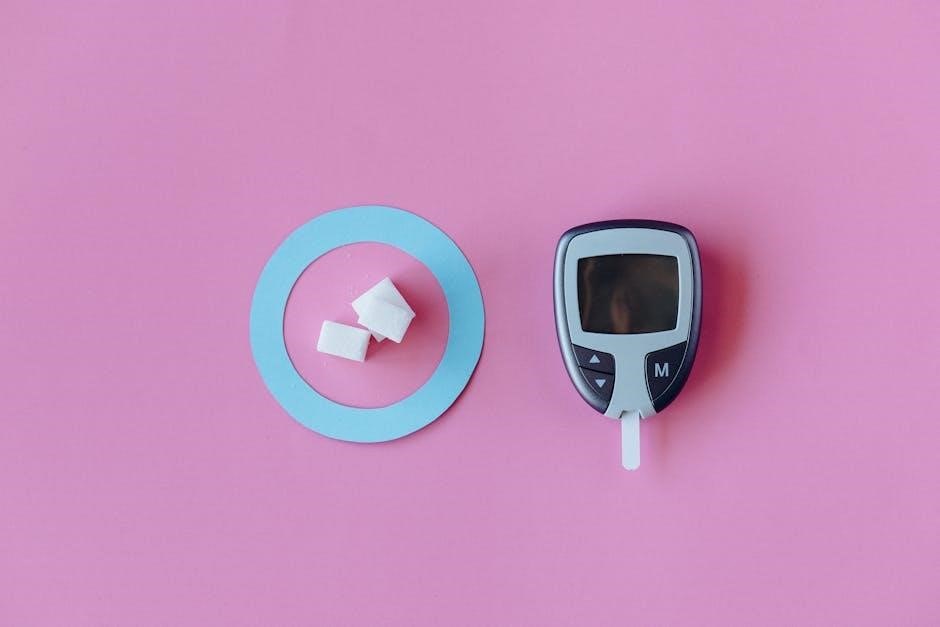
Tracking Your Progress
Track your progress by monitoring weight, measurements, and blood sugar levels. Use a journal to document meals, cravings, and energy levels to stay motivated and adjust plans.
Keeping a Food Diary
Keeping a food diary is essential for tracking your progress on the 14-day no sugar diet. Write down every meal, snack, and drink you consume daily, including portion sizes and sugar content. Note how you feel physically and mentally after eating. This helps identify patterns, cravings, and areas for improvement. Include physical symptoms like energy levels or bloating to better understand your body’s response. Regularly reviewing your diary can help you stay accountable and make informed decisions to stick to your low-sugar lifestyle.
Monitoring Blood Sugar Levels
Monitoring blood sugar levels is crucial during the 14-day no sugar diet. Use a glucometer to track your glucose levels, especially after meals and in the morning. This practice helps identify how your body reacts to dietary changes, ensuring better blood sugar control and improved insulin sensitivity. Regular monitoring can reveal significant reductions in glucose spikes, leading to more stable energy levels and overall better health outcomes. Tracking your progress can also serve as a powerful motivator to stick with your low-sugar lifestyle.
Weekly Weigh-Ins
Weekly weigh-ins are a valuable tool for tracking progress on the 14-day no sugar diet. Consistency is key—choose the same day and time each week to weigh yourself. This helps monitor weight loss accurately and provides motivation to stay on track. Keep a record of your weight alongside your food diary to identify patterns and correlations. Remember, weight fluctuations can occur, so focus on overall trends rather than daily changes. Regular weigh-ins reinforce accountability and highlight the positive impact of your low-sugar lifestyle.

Additional Tips for Success
Stay hydrated, incorporate physical activity, and practice mindful eating. Plan balanced meals and snacks to maintain energy and motivation throughout your 14-day no sugar journey.
Hydration
Staying hydrated is crucial for overall health and supports your 14-day no sugar diet. Drink plenty of water throughout the day to flush toxins and reduce sugar cravings. Herbal teas and low-sugar electrolyte drinks can also help replenish fluids. Avoid sugary beverages like soda and fruit juices, as they contain empty calories and can hinder progress. Proper hydration aids digestion, boosts energy, and supports metabolism, making it easier to stick to your diet plan and achieve better results.
Physical Activity
Regular physical activity complements the 14-day no sugar diet by boosting metabolism and aiding weight loss. Aim for at least 30 minutes of moderate exercise daily, such as brisk walking, cycling, or swimming. Strength training can also help build muscle and burn calories more efficiently. Exercise reduces sugar cravings and improves insulin sensitivity, making it easier to stick to your diet. Incorporate a mix of cardio and resistance exercises to maximize benefits and support your overall health goals during and after the diet.
Mindful Eating
Mindful eating is a powerful tool to enhance your 14-day no sugar diet journey. It involves paying full attention to the experience of eating, savoring each bite, and listening to your body’s hunger cues. This practice helps reduce overeating and promotes better digestion. By focusing on whole, nutrient-dense foods, you can make intentional choices that align with your diet goals. Slow down, eliminate distractions, and enjoy the flavors and textures of your meals to foster a healthier relationship with food and support long-term success.
The 14-day no sugar diet is a transformative journey to reduce sugar dependence and adopt healthier habits. Stay committed to your new lifestyle for long-term success.
Final Thoughts on the 14-Day No Sugar Diet
Completing the 14-day no sugar diet is a significant achievement that empowers you to take control of your health. By eliminating added sugars, you’ve likely experienced improved energy, better digestion, and a clearer mindset. While challenges like cravings and social pressures may have arisen, the benefits of a low-sugar lifestyle far outweigh them. Remember, this journey is not just about two weeks—it’s about building sustainable habits that promote long-term wellness. Stay committed and celebrate the positive changes you’ve made to your diet and overall health.
Maintaining a Low-Sugar Lifestyle
Maintaining a low-sugar lifestyle beyond the 14-day diet requires mindful choices and consistent habits. Focus on whole, nutrient-dense foods like vegetables, lean proteins, and healthy fats. Gradually reintroduce natural sugars, such as those in fruits, but avoid added sugars. Meal prepping and setting realistic goals can help you stay on track. Celebrate small victories and remind yourself of the health benefits you’ve achieved. By making this lifestyle sustainable, you’ll continue to enjoy improved energy, better digestion, and overall well-being for the long term.

